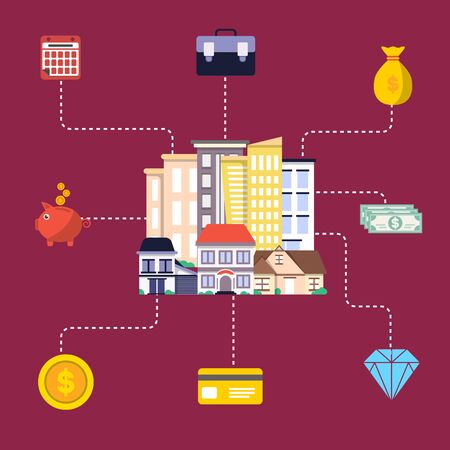What is Mortgage Refinancing?
Mortgage refinancing is when a homeowner replaces their current home loan with a new one, usually to get better terms or rates. It’s a common financial move in the United States, and understanding how it works can help you decide if it fits your homeownership goals.
How Does Mortgage Refinancing Work in the US?
When you refinance your mortgage, you pay off your existing loan with a new one, often from a different lender. The process is similar to getting your original mortgage—you’ll need to apply, provide documentation about your income and credit, and go through an approval process. Homeowners typically consider refinancing for reasons like lowering their monthly payments, shortening the loan term, switching from an adjustable-rate to a fixed-rate mortgage, or tapping into home equity for cash (known as a cash-out refinance).
Key Concepts of Mortgage Refinancing
- Interest Rate: The rate you pay on the borrowed money. Lower rates mean lower monthly payments.
- Loan Term: The length of time you have to repay the loan (commonly 15 or 30 years).
- Closing Costs: Fees paid at the end of the refinancing process, usually 2-5% of the loan amount.
- Equity: The difference between your home’s value and what you owe on your mortgage.
Types of Mortgage Refinancing Options
| Refinance Type | Description | Common Use Cases |
|---|---|---|
| Rate-and-Term Refinance | Changes the interest rate, loan term, or both without changing the loan amount significantly. | Lower monthly payment or pay off mortgage faster |
| Cash-Out Refinance | You borrow more than you owe on your current mortgage and take the difference in cash. | Home improvements, debt consolidation, large expenses |
| Streamline Refinance | A simplified refinance option for existing government-backed loans (FHA, VA), often requiring less paperwork. | Simpler process for those with FHA or VA loans wanting better terms |
| No-Closing-Cost Refinance | The lender covers closing costs in exchange for a slightly higher interest rate. | If you don’t want to pay upfront fees but are okay with a higher rate |
Who Should Consider Refinancing?
If you have improved your credit score since buying your home, interest rates have dropped, or you need extra cash for major expenses, refinancing could make sense. However, it’s important to weigh the costs and benefits before making a decision. Understanding these basics will help as we dive deeper into the pros and cons of mortgage refinancing in upcoming sections.
2. The Potential Benefits of Refinancing
Lowering Your Monthly Payments
One of the main reasons homeowners consider refinancing is to reduce their monthly mortgage payments. By securing a lower interest rate or extending the loan term, you can make your payments more manageable and free up cash for other expenses. This can be especially helpful if your financial situation has changed or if you want to improve your monthly budget.
Reducing Your Interest Rate
Refinancing gives you the chance to lock in a better interest rate, especially if rates have dropped since you got your original loan or your credit score has improved. Even a small reduction in your rate can save you thousands over the life of your loan. Many Americans use this opportunity to pay less interest overall and reach their financial goals faster.
Accessing Home Equity
If youve built up equity in your home, a cash-out refinance lets you tap into that value for big expenses like home renovations, paying off high-interest debt, or covering college tuition. This means you replace your old mortgage with a new one for a larger amount and receive the difference in cash. It’s a popular option when you need funds for major life events.
Common Uses for Cash-Out Refinancing
| Purpose | Description |
|---|---|
| Home Improvements | Finance remodeling projects to increase your homes value or comfort. |
| Debt Consolidation | Pay off higher-interest debts like credit cards using lower-rate mortgage funds. |
| Education Expenses | Cover costs for college tuition or other major educational needs. |
| Major Purchases | Access funds for things like buying a car or investing in a business. |
Switching Loan Types for More Flexibility
Refinancing can also allow you to switch from an adjustable-rate mortgage (ARM) to a fixed-rate mortgage—or vice versa—depending on what works best for you now. Fixed-rate mortgages offer predictable payments, while ARMs might start with lower rates that adjust over time. Making this change can bring peace of mind or help you take advantage of current market conditions.
![]()
3. Possible Drawbacks and Risks
While mortgage refinancing can offer great benefits, its important to be aware of the potential downsides. Let’s break down some common risks and situations where refinancing might not be the best option for your homeownership journey.
Closing Costs Can Add Up
Refinancing isn’t free. Just like when you first got your mortgage, you’ll face closing costs that usually range from 2% to 6% of your loan amount. These fees can include appraisal charges, title insurance, application fees, and more. Here’s a simple breakdown:
| Type of Closing Cost | Typical Amount |
|---|---|
| Appraisal Fee | $300 – $500 |
| Title Insurance | $400 – $900 |
| Application/Processing Fees | $200 – $500 |
| Attorney Fees (if required) | $500 – $1,000+ |
Extending Your Loan Term
If you refinance into a new 30-year mortgage, even if you’ve already paid several years on your current loan, you could end up paying more in interest over time—even with a lower rate. This is because you’re stretching out your payments for a longer period.
Example:
- If you have 20 years left on your current mortgage and refinance to a new 30-year term, you add 10 extra years of payments.
Impact on Your Credit Score
Applying for refinancing triggers a hard inquiry on your credit report, which may cause your score to dip slightly. Multiple applications in a short period can have a greater effect. However, this impact is usually temporary if you manage your credit responsibly.
When Refinancing May Not Be Worth It
There are situations where refinancing doesn’t make sense:
| Situation | Why It Might Not Be Beneficial |
|---|---|
| You plan to move soon | You may not stay long enough to recoup the closing costs through monthly savings. |
| Your existing mortgage has a prepayment penalty | This fee can offset any benefit from refinancing. |
| Your credit score has dropped | You might not qualify for better rates than your current mortgage. |
Key Takeaway:
Always weigh the upfront costs against the potential long-term savings before deciding to refinance. Consider how long you plan to stay in your home and whether lowering your payment truly outweighs starting a new loan term or paying additional fees.
4. Key Factors to Consider Before Refinancing
Current Mortgage Rates
One of the most important things to check before refinancing your mortgage is the current interest rates. If today’s rates are significantly lower than your original rate, refinancing could help you save money on your monthly payments and over the life of your loan. However, if rates haven’t dropped much, it might not be worth the effort or costs involved.
Your Personal Financial Goals
Think about what you want to achieve with refinancing. Are you hoping to lower your monthly payment, shorten your loan term, or cash out some equity for home improvements or other expenses? Your specific goals will help guide whether refinancing makes sense for you right now.
Credit Health
Your credit score plays a big role in the interest rate you’ll qualify for when refinancing. If your credit has improved since you first got your mortgage, you may be eligible for better rates. On the other hand, if your credit has taken a hit, refinancing could cost more than expected.
Length of Stay in Your Home
If you plan to move in the next few years, refinancing might not make financial sense. That’s because it takes time to break even on closing costs and other fees. Use this table to estimate if refinancing fits your timeline:
| Years Planning to Stay | Is Refinancing Worth It? |
|---|---|
| Less than 2 years | Usually No |
| 2-5 years | Maybe (Depends on savings & fees) |
| More than 5 years | Often Yes |
Other Costs and Fees
Don’t forget about the closing costs, appraisal fees, and possible prepayment penalties that come with refinancing. These can add up quickly and reduce any potential savings. Make sure you compare these expenses against how much money youll save with a new loan.
Summary Table: What to Check Before You Refinance
| Factor | What to Look For |
|---|---|
| Interest Rates | Are current rates lower than your existing mortgage? |
| Your Credit Score | Has your credit improved since getting your original loan? |
| Financial Goals | Lower payment, shorter term, or cash out? |
| Length of Stay | Will you stay long enough to benefit from savings? |
| Total Costs & Fees | Will fees outweigh the benefits? |
If you carefully consider these key factors, youll be in a stronger position to decide if refinancing is right for your current situation as a homeowner in America.
5. Is Mortgage Refinancing Right for You?
Guidance on Making an Informed Decision
Deciding whether to refinance your mortgage can feel overwhelming, but breaking it down into simple steps can help you make the best choice for your homeownership journey. Here’s how you can figure out if refinancing is a smart move for you.
Questions to Ask Yourself
Start by asking yourself a few important questions:
- What is my current interest rate compared to today’s rates?
- How long do I plan to stay in my home?
- What are the total costs and fees involved in refinancing?
- Will refinancing lower my monthly payment or help me pay off my loan faster?
- Am I looking to access cash from my home’s equity?
Comparison Table: Should You Refinance?
| Situation | Refinancing May Be a Good Idea If… | Consider Waiting If… |
|---|---|---|
| You want a lower monthly payment | New rates are significantly lower than your current rate | Your new payment won’t save you much after fees |
| You plan to move soon | You’ll break even before moving | You’ll move before recouping closing costs |
| You want to pay off your loan faster | You can switch to a shorter term with manageable payments | The higher payments would strain your budget |
| You need cash for big expenses | Your home has built enough equity for a cash-out refi | Tapping equity puts your financial security at risk |
Working with Lenders
Not all lenders are created equal. Shop around and talk to at least three different lenders. Ask about:
- Interest rates and annual percentage rates (APR)
- Total closing costs and any hidden fees
- The break-even point—how long it takes for savings to outweigh upfront costs
- If there are prepayment penalties on your current mortgage
Tools and Resources to Help You Decide
Use online calculators to estimate your new monthly payment, total interest savings, and when you’ll break even on closing costs. The Consumer Financial Protection Bureau (CFPB) offers easy-to-use tools, and many banks provide their own calculators. Don’t hesitate to reach out to a trusted financial advisor or housing counselor if you have questions.
Helpful Resources:
- CFPB Mortgage Refinance Guide
- Bankrate Refinance Calculator
- Your local credit union or bank’s mortgage specialist
The right decision comes down to your personal goals, finances, and plans for the future. Take your time, compare offers, and use all the tools available so you can move forward with confidence.


